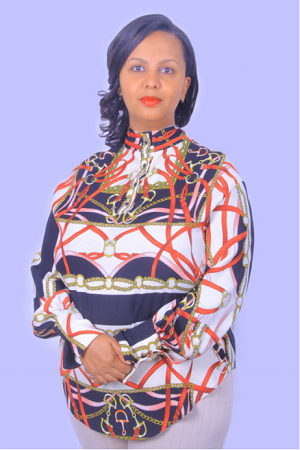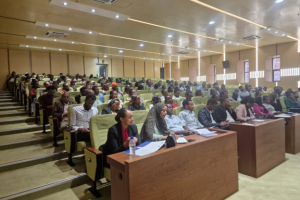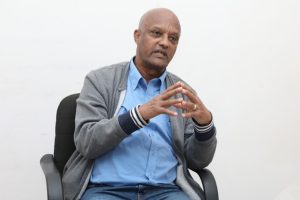
In a society where gender disparities and social challenges hinder women’s progress, visionary leaders like Mickal Mamo Mamo are making a difference. As the founder of Adey Pads, she is promoting women’s rights, health awareness, and social change by producing affordable sanitary products. On International Menstrual Hygiene Day, celebrated globally under the theme “Together For a #PeriodFriendly World,” Ethiopia also marked the occasion with enthusiasm, advocating for zero taxation on menstrual products. The Ethiopian Herald spoke with Mickal to highlight her inspiring work and efforts to improve menstrual health and rights nationwide.
Mickal Mamo’s story is one of resilience. With a background in business, she initially focused on family and business ventures. In 2017, she entered the garment industry, producing local children’s wear and sportswear, challenging stereotypes about quality. Her passion for promoting Ethiopia’s products and supporting economic growth inspired her shift toward addressing period poverty.
However, her journey took a transformative turn when she became involved in the sanitation sector, inspired by friends engaged in producing sanitary pads. This shift was motivated by her deep awareness of the critical issues women face—especially in terms of menstrual health and hygiene. Recognizing the pressing need for affordable and accessible sanitary products, Mickal dedicated herself to addressing this gap, ultimately founding Adey Pads.
Before fully committing to her new mission, Mickal spent six months studying the market landscape. Her meticulous research revealed the extent of period poverty—a multifaceted issue that extends beyond the mere absence of sanitary pads. She understood that the challenge was not only about affordability but also about lack of awareness, inadequate facilities, and social stigmas.
Her vision for Adey Pads was driven by a desire to create social impact. She envisioned a society where women and girls could manage their menstruation with dignity, without the fear of shame or exclusion. Her background in business administration provided her with the skills necessary to develop sustainable solutions that combine social good with economic viability.
Mickal firmly believes that period poverty is a complex issue, encompassing more than just the lack of sanitary products. In Ethiopia, it manifests in various forms girls in rural areas often miss school due to inaccessible facilities or inability to afford pads. Even in urban settings like Addis Ababa, many women and girls struggle to purchase a single pad, often forced to resort to unhygienic alternatives that jeopardize their health.
Moreover, the problem is compounded by inadequate sanitation infrastructure. Many public restrooms lack clean water, private changing rooms, or proper disposal facilities—factors that make managing menstruation a daily challenge for women and girls. Information scarcity further exacerbates the issue; misconceptions about menstruation persist, and cultural taboos prevent open discussions, leaving many in the dark about proper hygiene practices.
One of Mickal’s core commitments is ensuring that her social enterprise inclusively supports marginalized groups, particularly women and girls with disabilities. Often overlooked in discussions about menstrual health, individuals with disabilities face additional hurdles lack of accessible pads, inadequate facilities, and insufficient training on product use.
Adey Pads actively works to fill this gap by providing disability-friendly, reusable sanitary pads and tailored training sessions. These are delivered through multiple channels—audio, video, flyers, and sign language—to ensure accessibility for all. Mickal emphasizes that supporting women with disabilities is not just a moral obligation but a step toward building an equitable society.
She advocates for a comprehensive approach where stakeholders—including government agencies, educators, health practitioners, and community organizations—collaborate to create enabling environments. Mickal underscores that empowering women and girls with disabilities requires concerted effort, awareness campaigns, and infrastructural improvements such as accessible sanitation facilities and changing rooms.
Adey Pads also extends its support to individuals with mental incapacities, such as autism spectrum disorder. These individuals often face unique challenges in managing menstruation due to limited understanding or physical limitations. To address this, Adey Pads collaborates with partners to develop specialized training programs, ensuring that caretakers and affected individuals are equipped with the necessary knowledge and resources.
A significant aspect of Mickal’s work involves challenging societal taboos surrounding menstruation. In Ethiopia, as in many countries, menstruation is still considered a taboo subject—hidden from public discussion, often shrouded in shame. This silence perpetuates misinformation, stigma, and inadequate facilities.
Adey Pads actively participates in awareness campaigns, especially during national events like the Week of Menstrual Hygiene. This year, the theme “Towards Zero Taxation” emphasizes that menstrual products should not be taxed, framing the issue as a matter of rights and social justice. Mickal stresses that menstruation is not a luxury but a fundamental aspect of women’s health and dignity.
Her organization collaborates with schools, youth groups like Girl Scouts, and media outlets to disseminate accurate information about menstruation. Initiatives include engaging boys through the “He for Her” movement, encouraging them to support their female peers and challenge traditional stereotypes. Such efforts aim to normalize conversations about menstruation, ultimately leading to healthier attitudes and environments.
Mickal advocates for policies that recognize menstrual health as a vital component of public health and education. She emphasizes that zero taxation on sanitary products is essential to make them affordable for all women and girls, especially those from low-income backgrounds. She points to neighboring African countries like Rwanda and Kenya, which have successfully incentivized local production through tax exemptions, reducing costs and increasing accessibility.
Mickal emphasizes the need for safe, hygienic spaces in schools, workplaces, and public areas to help women and girls manage menstruation confidently. Adey Pads promotes awareness, infrastructure improvements, and hygiene education, with special focus on girls with disabilities who face extra barriers. The organization provides accessible training and advocates for inclusive sanitation facilities. Mickal stresses that supporting vulnerable groups requires a collaborative effort among government, NGOs, schools, and communities to ensure all women and girls have proper sanitation and dignity.
In her view, creating a society where menstruation is openly discussed and managed without shame is essential for empowering women and girls to pursue their education and employment opportunities. She urges stakeholders to work together to eliminate myths, improve facilities, and promote a rights-based approach to menstrual health.
Mickal Mamo journey exemplifies how one individual’s passion, combined with strategic action, can bring about meaningful social change. Her work through Adey Pads is more than about producing sanitary products; it is about empowering women, challenging societal taboos, and advocating for policies that uphold women’s rights and dignity.
Her message is clear: “Pad is everything for every girl.” Ensuring access to affordable, quality menstrual products, and creating awareness, are crucial steps toward achieving gender equality and social justice. As Ethiopia and the world move towards more inclusive development, Mickal’s vision reminds us that addressing menstrual health is not just a health issue—it is a fundamental human rights issue that demands collective action.
A significant aspect of Mickal’s work involves challenging societal taboos surrounding menstruation. In Ethiopia, as in many countries, menstruation is still considered a taboo subject hidden from public discussion, often shrouded in shame. This silence perpetuates misinformation, stigma, and inadequate facilities
BY LEULSEGED WORKU
THE ETHIOPIAN HERALD THURSDAY 29 MAY 2025




